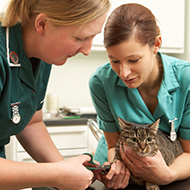
The framework is reviewed by the College every five years.
A new veterinary nurse training framework has been launched by the RCVS.
The framework is based on an extensive review of the Standards Framework for Veterinary Nurse Education and Training, and aims to provide students 'with the best training possible in order to prepare them for life in clinical practice.'
“Animal health and welfare and public safety are central to our standards, and it is important that we continue to review them on a regular basis with input from veterinary nurses from across the profession,” said Julie Dugmore, RCVS director of veterinary nursing.
“Over the summer, we held a number of educator meetings to help familiarise AEIs, delivery sites, and TPs with the new framework, in order to make the transition as smooth as possible.”
The RCVS reviews the framework every five years to ensure approved institutions, delivery sites, and training practices can provide fresh approaches to student veterinary nurse education while being accountable for the local delivery and management of accredited programmes.
The new standards came into force on 1 September 2024 and are available to download on the RCVS publications page.
Image (C) Shutterstock



 A set of international guidelines for disease surveillance in wildlife has been updated for the first time since 2015.
A set of international guidelines for disease surveillance in wildlife has been updated for the first time since 2015.